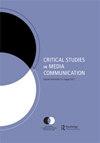忽略铁轨上的血迹:游戏研究的退出和偏离
IF 1.5
2区 文学
Q3 COMMUNICATION
引用次数: 1
摘要
在这篇文章中,我将探讨游戏研究在培养那些继续在游戏行业工作或学习的学生中的作用。我用女权主义的视角来批判“管道泄漏”这个比喻,讨论了这个比喻是如何导致集体失忆的,它让游戏研究忽略了与游戏和游戏制作行业相关的更大的文化问题。取而代之的是,我用尼尔·德格拉斯·泰森(Neil deGrasse Tyson)的“血迹斑斑”(blood on the tracks)来形容一些人是如何被主动赶出我们的领域的。作为一种前进的方式,我建议通过重新设想我们如何教授游戏研究的起源点,它将为我们的领域提供一个更光明,更多样化的未来。本文章由计算机程序翻译,如有差异,请以英文原文为准。
Ignoring the blood on the tracks: exits and departures from game studies
ABSTRACT In this article I examine game studies’ role in training students who go on to work in or study the games industry. Using a feminist lens to critique the leaky pipeline metaphor, I discuss how this metaphor assists in a collective amnesia that allows game studies to ignore the larger culture problems associated with games and the industry that makes them. In its place, I offer up Neil deGrasse Tyson’s use of “blood on the tracks” to describe how some people are actively pushed out of our field. As a way forward, I suggest that by reimagining how we teach game studies’ genesis point, it will offer up the potential for a brighter, more diverse future for our field.
求助全文
通过发布文献求助,成功后即可免费获取论文全文。
去求助
来源期刊

Critical Studies in Media Communication
COMMUNICATION-
CiteScore
2.10
自引率
0.00%
发文量
34
期刊介绍:
Critical Studies in Media Communication (CSMC) is a peer-reviewed publication of the National Communication Association. CSMC publishes original scholarship in mediated and mass communication from a cultural studies and/or critical perspective. It particularly welcomes submissions that enrich debates among various critical traditions, methodological and analytical approaches, and theoretical standpoints. CSMC takes an inclusive view of media and welcomes scholarship on topics such as • media audiences • representations • institutions • digital technologies • social media • gaming • professional practices and ethics • production studies • media history • political economy. CSMC publishes scholarship about media audiences, representations, institutions, technologies, and professional practices. It includes work in history, political economy, critical philosophy, race and feminist theorizing, rhetorical and media criticism, and literary theory. It takes an inclusive view of media, including newspapers, magazines and other forms of print, cable, radio, television, film, and new media technologies such as the Internet.
 求助内容:
求助内容: 应助结果提醒方式:
应助结果提醒方式:


